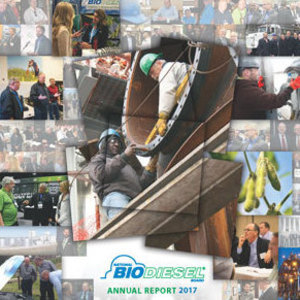NBB Annual Report Highlights Industry Success Stories

October 27, 2017
BY The National Biodiesel Board
The National Biodiesel Board exists to serve and provide value to its members. Functioning much like a farm coop, members pool their resources, share expenses and gain scale to reach achievements that wouldn’t be possible individually. Members define the direction of the association each year through the annual program plan process that becomes the playbook for staff to execute. The success stories highlighted in NBB’s FY17 Annual Report are a result of highly coordinated efforts among a multitude of program areas working in concert to move the industry forward.
“This year, we saw many challenges as a trade association but we also saw significant successes,” said NBB CEO Donnell Rehagen. “All of which would not be a reality without the support of the membership, and our hard-working, dedicated team of experts pulling towards a singular goal.”
One of the greatest benefits of NBB membership is the ability of the organization to leverage membership dues dollars with outside funding sources. Member dues made up only a third of NBB’s total revenue in FY17. For every $1,000 in membership dues paid, NBB members receive the benefit of nearly $3,500 in revenue support through the trade association’s ability to secure outside funding.
“Membership in NBB is a tremendous value due to the outside funding NBB is able to secure,” said Brad Shimmens, NBB director of operations and membership. “You would be hard-pressed to find this kind of return on investment anywhere else.”
Successes in 2017 include continued implementation of the California Low Carbon Fuel Standard and Oregon Clean Fuels Program that generated carbon credits for the industry in excess of $250 million, the reduction of biodiesel’s indirect land use change penalty used by regulators to craft biofuels policy by 37 percent, General Motors’ announcement of 20 diesel vehicles, all approved for B20, and much more.
Learn more about the National Biodiesel Board at www.NBB.org and see this year’s Annual Report at NBB.org/results/project-showcase.
Advertisement
Advertisement
Advertisement
Advertisement
Related Stories
Bangkok Airways Public Company Limited has officially announced the adoption of sustainable aviation fuel (SAF) on its commercial flights, reinforcing Thailand’s green aviation industry. The initiative took effect starting July 1, 2025.
Avalon Energy Group LLC and Sulzer Chemtech have signed a strategic alliance and partnership agreement to scale up the production of SAF. Under the agreement, Avalon has selected BioFlux technology for its portfolio of SAF projects.
Neste and DHL Express have strengthened their collaboration with the supply of 7,400 tons (9.5 million liters) of neat, i.e. unblended, Neste MY Sustainable Aviation Fuel to DHL Express at Singapore Changi Airport starting July 2025.
CoBank’s latest quarterly research report, released July 10, highlights current uncertainty around the implementation of three biofuel policies, RFS RVOs, small refinery exemptions (SREs) and the 45Z clean fuels production tax credit.
The U.S. Energy Information Administration maintained its forecast for 2025 and 2026 biodiesel, renewable diesel and sustainable aviation fuel (SAF) production in its latest Short-Term Energy Outlook, released July 8.
Upcoming Events










